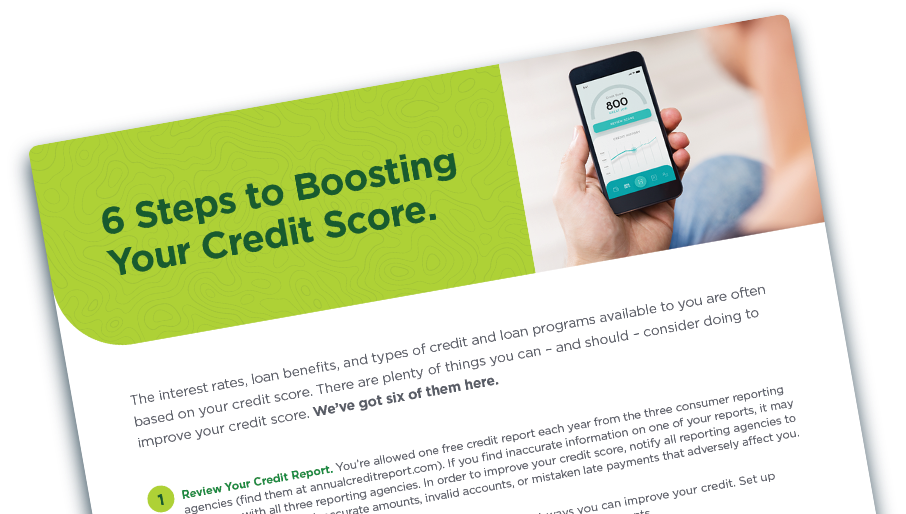Why Good Credit is Crucial for Student Loans

Make sure you’re building good credit the right way.
Throughout life, a good credit score is key to taking big financial steps—and college funding is no different. It can be the difference between qualifying for a loan or not, or paying a higher interest rate over time.
Your credit score is a three-digit number that can determine a lot. Credit scores are calculated using a number of factors. These include on-time payments, number of credit cards you have and their balances, and length of your credit history. Your credit score is used to determine your qualifications for loans, credit cards, apartments, and many other things. It’s important to know your score and what it means.
Get Your FREE Credit Score Tips Today
Learn about the 6 Steps to Boosting Your Credit Score, and put your college funding in the best position possible.
FREE DOWNLOAD


What is a good credit score?
Each lender has a different definition of good credit. They each place varying importance on the factors they consider when determining if they will lend to you.
Credit Score Composition 1
- 35% Payment history
- 30% Amounts owed on credit and debt
- 15% Length of credit history
- 10% New credit
- 10% Types of credit used
If you look at five different websites, you will likely get five different answers to this question. These varying answers occur because each lender has a different definition of good credit. They each place varying importance on the factors they consider when determining if they will lend to you.


Who checks my credit?
Banks and credit card institutions aren’t the only entities using your credit history to make decisions. In most cases, you must consent for a party to check your credit, but they do not always require your permission. Landlords, current or future employers, insurance companies, mobile service providers, utility companies, as well as television and internet providers may use your credit to decide whether or not do to business with you. While some businesses, like public utility companies, cannot deny you service for having poor credit, they might require you to pay a deposit before turning on your service.
How do I check my credit score?
You get one free credit report every 12 months from each of the three credit reporting agencies (Equifax, Experian, and TransUnion). Visit AnnualCreditReport.com to request your free credit reports. If you want to monitor your credit more frequently, sites like Credit Karma will offer you free credit scores, reports, and recommendations to maintain or better your credit.


How do I attain and keep a good credit score?
Improving your credit score is a long, ongoing process. When it comes to credit cards, you should pay down your balances and keep them low. Your score can also benefit from reducing the amount of credit cards you use to just one or two cards. To keep your credit score high, make sure you make all of your monthly payments on time, pay off your credit cards in full every month, work hard to reduce any debt that you owe, and only spend the money you’ve earned.
Credit will play an important role in financial decisions throughout your life, and while it’s possible to rebuild a poor credit score, it can take years and a lot of planning. When you begin establishing credit, make sure you are making responsible financial decisions to avoid having a poor decision now, affect your opportunities later in life.
1 myFICO.com. “What’s in my FICO® Scores?, https://www.myfico.com/credit-education/whats-in-your-credit-score” Accessed April 29, 2021.
Nelnet Bank does not provide legal, investment, tax, or financial advice. This page and the information contained herein is for informational purposes only. This content is not meant to address the circumstances of any particular individual. Nothing contained in this article constitutes a recommendation or endorsement by Nelnet Bank. For specific advice about your unique circumstances, consult with a qualified professional.
From time to time, articles may provide hyperlinks to web pages operated by third parties. When you click on these hyperlinks, you will be leaving Nelnet Bank’s website. Nelnet Bank has no control over such sites or their content, and is not responsible or liable for any such site or content. Nelnet Bank does not endorse or recommend the contents of the third-party sites. Your use of a third party website is subject to their terms of use and privacy policy.

